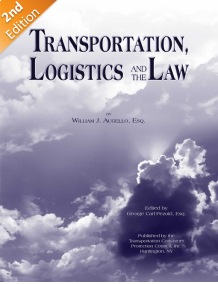What you will learn?
It not only relates the laws and regulations, carrier tariffs and practices governing transportation and logistics in today’s environment; it focuses on the problem areas that have resulted in disputes and litigation? and suggests how these pitfalls can be avoided. It covers real-world experiences during the author’s 50 years of practicing transportation law, during which he counseled shippers and their trade associations, carriers, brokers and freight forwarders on a wide variety of problems.
You will learn about:
- Surface carriers, brokers and railroads may now be sued for damages and attorney fees for any violations of the Interstate Commerce Act.
- There are financial risks when shipping “COD”.
- Motor carriers are limiting their liability in ways that the ICC would not have allowed.
- A shipper may be bound by unfiled tariff provisions of which it was unaware.
- Motor carriers need not inform shippers of their tariff provisions unless the shipper requested a copy of the carrier’s tariff before shipping.
- Depositing a claim check for less than the claimed amount may foreclose collecting the full amount.
- Household Goods Carriers are still subject to strict government regulation.
- Parcel Express Carriers are still subject to some regulation and laws.
- Carriers have a duty to inspect shipper-loaded vehicles before leaving origin.
- Manufacturers are at risk when partially-damaged shipments are sold in salvage sales.
- How a BMC 32 and an FF 32 Endorsement protects shippers when a carrier fails to pay a lawful loss or damage claim.
- How the Classification System can adversely impact shippers and receivers.
- How and when a carrier may have a lawful lien on goods in its possession.
- How long records must be preserved.
- How and when your firm is exposed to costly lawsuits.
- How to determine if a third party logistics provider may have a conflict of interest.
- The penalties and fines for violating the statutes and regulations in effect today.
Why do transportation and logistics personnel need to know about laws and regulations? Because:
- Every shipment of freight moves on a contract of carriage of some type that contains legal terms and conditions defining the rights and duties of the parties to the transportation or distribution agreement.
- The federal government currently offers less protection for the shipping public, although it continues to regulate all carrier industries to some degree.
- Shippers’ and receivers’ rights vis-à-vis carriers and intermediaries, and between carriers and intermediaries, are governed by laws and legal principles.
- Transportation and logistics are quasi-legal subjects that require an understanding of the laws that govern every party in the distribution cycle.



